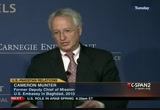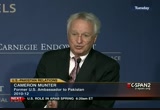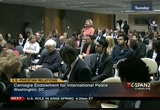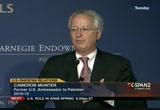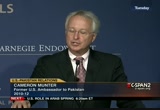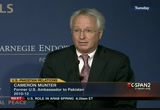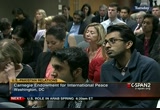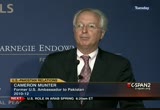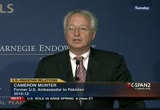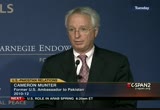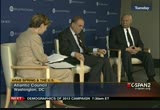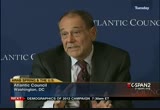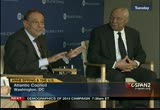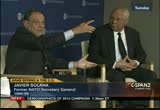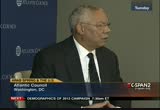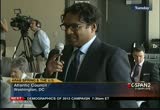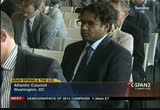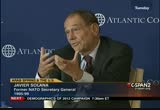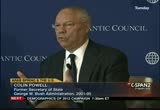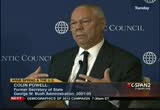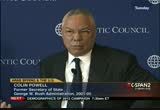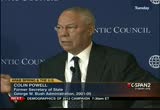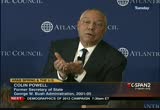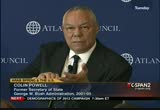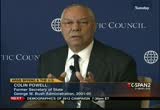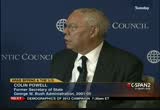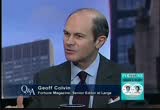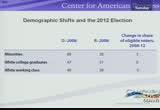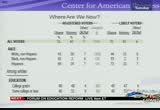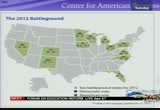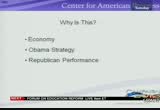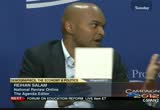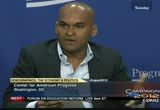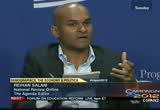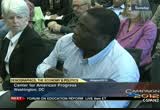tv Today in Washington CSPAN September 27, 2012 6:00am-9:00am EDT
7:00 am
with this. in my four years as secretary, my two years as national security advisor and he loves chairman of joint chiefs of staff, this was a continuing issue that i tried ever way i could figure out working with several presidents to see if we could not find a solution. we haven't found a solution. at the current time with the arab spring and changes that have taken place, i am pleased that for the most part earlier agreements are being kept, particularly between egypt and israel. and i hope that remains the case. i hope that as we continue the evolution of the arab spring in these various countries and if they do what we hope they will be doing, then they will have stable relations with israel, unlike the old days where we old power meets together and they. that's not going to happen. israel remains very for strong as a nation, and as allies, particularly the united states of america who will always be
7:01 am
there. iran being the one big exception to all of us. we can talk about iran. i think everyone pretty much understand where we are. and so i do not see in the immediate future of breakthrough in a peace process. i think that israel is secure, comfortable, and i don't sense that their political situation will allow them to make the kind of compromises or offers that would move it forward. and mr. assad is here now and he is taking the general assembly and that which is complicated. so i don't think much will change in the foreseeable future. with respect to the other countries, especially those in the gulf area, a couple things strike me. they are all modern, where as the ones that when we were not modern. even though it's not the kind of institution that i could think would provide the wherewithal, but to some extent they
7:02 am
represent some sort of institution that the people look to. and they all are wealthy. for the most part. and so they can provide for their people are and keep things under control even though you have some disturbances in bahrain. but as doctor solana said, the saudis are not going to let that get out of control. so i think the evolution will be much, much slower in those parts of the area. our member talking to a senior official from one of those countries, and this was during my time as secretary, talking about freedom this and that, and all the universal rights that we take for granted. and the response from the individual is welcome we certainly appreciate your system and we are glad it works for you, but our system works for us. and we've been around for as long as you have. and so thank you for your interest in our welfare, but
7:03 am
we're going to do it our way. and my response was fine, but i think you will have to start thinking about changes. maybe not right away, but over time you'll find if you'll be a part of this global political system that's involving, this global economic system that is evolving, and if you're young people can watch television just like everybody else's young people, and see what the rest of the world is doing, they will start to ask day after day why not me, why not us? so i think those pressures are there in the gulf region, and sooner or later some response, doesn't mean you have to give up your system, it just means you'll have to respond to those pressures. most of the countries that i worked with in that part of the world understand this. and another one said to me, we have to move far more careful than you could move. we can take one step forward and then look around and see if everything is okay.
7:04 am
then we can think about another step. and if things don't locate we go right back one step. and so you have to give some understanding and credit to their ability to understand their history, their culture and their people. at the same time that should not cause us in europe or here in united states to shrink from our belief in universal rights. i think it's just the example we get to the rest of the world. and that example because of events in recent years and iraq and afghanistan and elsewhere, the fact that our political system is not functioning as smoothly as it might have at one point, not as smoothly as it could operate, i think we've lost a little bit of our ability to influence others in the world. we have to acknowledge that, and we have to regain that. and then they will perhaps start following some of the examples we've set forward. we are still the most successful
7:05 am
country, i think, democracy and the world. i think we been an example to asia, an example to europe. the doctor mentioned the marshall plan. that brought europe to where it is now. and i always am amused that people say this change can't happen. look at my european friends, they are all social democrats and they all have teams in queens. so i mean, it can happen. >> okay, more questions. >> hello everybody. i am from belgium and i'm currently working for the washington quarterly. i'd like to thank you both first for a very interesting talk. my question is directed to general powell who spoke of the right of self-determination of the universal right, which is not universally accepted. my question is, how can the u.s.
7:06 am
and the e.u. respect that right while taking position in a conflict in the country, speaking about syria, that is currently confronted with a civil war where of atrocities will always be committed by both sides. although of course i understand that those atrocities are greater than once are committed by -- and how do the respect that right in a situation of a civil war? >> it's not just accepting frederick it is essentially a position of the international world. helsinki accords to the u.n., but this isn't achievable in every country that we would like it to be right now. there are a lot of countries where you don't have those kinds of rights that we have good solid relations with china, like you mention, the largest in the world. so it is an aspiration and it is an aspiration that increasingly over time and over the last few years has become a reality. in sony parts of the world.
7:07 am
so we keep pushing the aspiration forward, keep hoping that country after country when a group of people after another, will learn to live in peace, learn to build a representative form of government. i would like these representative forms of government, when you said democracy they just think american, jeffersonian model, lots of models. but it's an aspiration for all of us that the people should have a right for self-determination. it's well documented and international accords that we are all assigned to. i hope it will happen in syria as well. we don't quite know how to make it happen in the immediate future. remember, we live with all of the countries in the arab spring for years without those rights being there. we found it necessary to accommodate ourselves to the fact that these were autocratic leaders and it was there people who finally pulled into. not us.
7:08 am
still unused that after we saw the problems with moammar gadhafi, within weeks everybody was racing to go visit him in his tent. and then suddenly a little -- things got very, very bad. let's take them out. so each one of these is tricky and difficult. there's no single easy solution that applies to all. >> you want to comment? >> well, i am very careful with the words of self determination. ya belgium. -- you have a belgium. [laughter] >> they were self determination means two things at the same time. concentrated on the self-determination that we choose the people that you want to run the country. then you go to your country, self-determination means --
7:09 am
[inaudible]. tricky point. not the end of the war. self-determination of the country. i understand the right to choose. you have leaders. i don't know, you call nation, whatever you want to call, but you have right to choose your leaders. it has not, doesn't know anybody but move your. 40 years -- but mubarak. 40 years of having the same ruler. pardon for being very, very boring, but it is really the level of corruption of that time in being in power. even if you don't, at the
7:10 am
beginning you -- [inaudible]. in that sense i think it is fundamental to have self-determination in the sense of having -- [inaudible] that you want to be governing your country. >> thank you. one in the back of the room. >> i'm with voice of america. on the idea of institution building, because general powell and dr. solana, talk about more in concrete terms. how is it done? >> it took us here in the united states a long time, and we really set the stage for ourselves with our constitution. body of law that was agreed to
7:11 am
by the representatives of all our states. so i believe institution building starts with the law. it starts with the law of the constitution and laws that come from those constitutions. and with a solid body of law, then you can start to build legislatures, courts, and the rest. i'll never forget a conversation i once had when the cold war was ending, the famous russian ambassador, we were in moscow, at the kgb hotel in moscow, a lovely place. anyway, we were having dinner and he was talking about gorbachev, the only microphones in the room was his and he was able to be candid. and so he said colin, you don't know what he's doing. he's making us crazy. i said how was he making you crazy? he is saying, remora gorbachev was a lawyer, he is saying that we have to put the society of
7:12 am
this country on the basis of law. if it isn't on the basis of law, then it is always up to the bureaucrats who can issue that cuts. so his goal is to put the soviet union if he could've kept it on th basis of law, and when the soviet union ended and we started rushing in to assist them with academics all over the world, the one thing we should've sent in in were lawyers and experts in writing law, especially commercial law. and so i think the building of institutions, we can help enormously with that by helping them put in place bodies of law that will sustain a society. and you can do that without being ideologic about or telling them how. this is why you needed. and so i think body of law that represents the global of people, and then you started building of institutions that will help build the society, including a
7:13 am
legislature, courts, free press. i don't think, absolute democratic or representative form of government, self-determined form of government can truly exist without somebody watching it and criticizing it and going after the government all the time. we have brought this to an extreme level of exquisite -- here in the united states. freedom of the press criticizes everything all the time. and we love. it's our system. wouldn't want it any other way. and so i think we can now bring that about but it requires a change in attitude and the part of government leaders to accept being criticized. we've seen some slip backward in recent times, who thought they were going to do this and realize hey, this is very uncomfortable, and have pushed back and are becoming less open to press criticism. you see it frequently, but i think that's part of the institution building.
7:14 am
laws, institutions, free society, open society, the ability of nongovernmental institutions to function and do things that could be critical of the government, and above all freedom of the press, and resourced to courts. if you feel your rights have been violated, either commercial or in private activity. >> i completely agree with general powell has just said. i can even make two more comments. one on the constitution. let me take an example. [inaudible] i want to remember very well -- [inaudible] i don't want to say that because he wouldn't like to hear that, but he wrote the constitution of the palestinian with me.
7:15 am
we did it together basically. and that was helping a lot to put things in. the other thing that happened, i would like to mention, when a country comes out of dictatorship, which has military component, you really get the new balance between civilians and military. it's very tricky and very difficult. and that there are countries that have bad experience and can elaborate -- [inaudible] that has been done in latin america. it's been done, we help a lot in latin america. i think if you have dealt very much on egypt. you had united states very close relationship with top military meetings, the new generation of military our new, and you didn't do with it so much and now they
7:16 am
minister of defense, chief of intelligence. they are new. and to create that relationship, and at the same time create a separation with civilians, military several roles in society which is modern society, it's tricky. we have to do it a lot in the countries that were coming from the soviet union. and that was a transition that we organized that will. and we have countries, mine for instance, came from a military dictatorship and we organized it. we had a spirit of how to handle that. and that is something that not many people have experienced, but i figure europeans and americans do have, and we should be more, trying to work in that direction. >> as the cold war was any there was a big meeting and all of the congress in vienna, i don't know if you recall this. we had all of the senior
7:17 am
military leaders from every european country, even included the vatican was represented there, and i was the first speaker, my russian colleague was across the hall from me. and i said, i'm chairman of the joint chiefs of staff, armed forces of the united states, and i live in a system in which my constitution was he doesn't trust me. and i said we'd my constitution. they only give me money for a limited period of time and then i had to go back and ask for more. they even made in the constitution that would provide for and maintain a navy since we were a maritime power. we want a strong navy all the time. but we will raise and support armies, meaning will only raise them when we need them. when we don't need them, get rid of them. so the pressure was always on to make sure we would never become too large militarily, or responsibilities change and we still have the largest force in the world because of our
7:18 am
responsibilities. but the other point i made to him is all of you in your in command of soldiers. you can order soldiers to do something. i cannot order a single american soldier to do anything. in a combat situation and less it has been approved by the secretary of defense and the president. i would have it no other way. that's our system. and i'm glad to see that many nations now do have civilian ministries of defense, and you know, you don't have the same risk as you use to. >> let me ask a brief follow-up. the issue of constitutions has come up several times now, tunisia, egypt are actively engaged in writing their constitutions. libya will becoming engaged in that shortly. we want to help these nations in the transition, want to get them economic health and so forth, but what she we do if they write in their constitution things
7:19 am
regarding, for example, the rights of women or the rights of different religious communities that, that we find highly troubling, that we think are a backward step or things related to the freedom of the media or the independence of the judiciary? should they be conditions -- shouldn't there be conditions? should we engage in quiet dialogue wax these are likely to arise. >> i think we should speak up and tell them we think these are problematic, because with the trends of history in recent years and not in accord with some of the u.n. documents that are out there. so that we should have no reservation on speaking out. but always remember, it is their constitution. you will see i think most of these nations were talking about will put something in there about being islamic nation, and that's not something i think we
7:20 am
would have basis of objective. so where we think it is something that they missed the boat on, i don't think we should be at least reluctant in the spirit of friendship in helping, tell them you might want to rethink this, or a good answer. >> i tend to agree with colin powell. i think that is something that we try not to use. try to use. all the conversation at the table come some nice advice and telling what may happen. and if for your our -- for your own country, we have to be very, very careful. and i mean for me as a european we cannot give -- [inaudible] because it is ours. this is a very tricky situation.
7:21 am
that balance is very delicate but for intelligent people to do it, it's not a single thing. it has to be done. i think there is no other way. >> thank you. >> damon wilson with the atlantic council. we started help galvanize this idea of remote coherent u.s. and european response, what was happening in north africa and middle east. yet we're trying to do this at a time when europe is gripped by the eurozone crisis, where the united states has been paralyzed in many respects by domestic political partisanship. and so my question to you is, is europe and north america, are we position to sort of rise to this historic challenge to play the right supporting role at this
7:22 am
critical time? how much are we hampered by what's happening with the eurozone? how much we hampered by the difficulties they don't our executive and legislative branches right now? >> let me just add to that, that i noted in the chicago council survey of american public opinion on foreign policy which just came out recently there were some very strange attitudes of americans regarding the middle east. there was a large majority of people saw the middle east as the region of the world most likely to create threats to the national security of the united states. and yet there was a general trend of wanting less involvement militarily, economically and so forth with this region. so i think along with what damon said, public opinion and how voters and citizens feel about the involvement of their countries in the middle east is another issue.
7:23 am
>> certain detail, very tricky dick the european union is going to disappear. it will continue without any doubt, even the eurozone. this is my position. now, for us, that part of the world, this part of the world we are talking about, is our neighborhood, southern neighborhood. and, therefore, the stability there is for migration, many things are related to that, mediterranean sea. so for us has to be a priority. and it will be a priority for ever. we will do it properly. we will do it properly, do it well. i don't know less attention, but always attention of any prime minister in the european union. more intensity on the south. the germans are very comfortable about that. having said that, i think that
7:24 am
the problem that we have, it could not be solved without the good cooperation between the europeans and the united states. and let me elaborate that further. the united states, according to what you have said, may have hesitation of abandoning the fact, that region of the world. and that is not, it could be reasonable, let me say that. if you look, for instance, that by the year 2014, you have already abandoned the act. by that year he will be, probably -- [inaudible]. you may be a country autonomous on energy. so you will not import energy,
7:25 am
oil, from any third country. what is the relation you have with south eurasia which you export today 10%, only 10%. with the chinese and the indians are more than 50%. now, this is the complete change of the scenario in the world. what is the reason why you have to be in this part of the world, if the reason why you came was oil and you don't need oil. the question. now, of course you cannot abandon this part of the world, the flow of oil -- [inaudible], et cetera, et cetera. but as secretary, it's not your oil but it is the oil of us you want to defend. so i think an order to avoid the
7:26 am
vacuum, potential back in, i think we have to go hand in hand with europeans and americans because to cover and guarantee that this part of the world is stable is in the interest of both. but, of course, your pressure from your own people and say you don't have oil, you don't need oil from that part, why? israel is there. it's a different story. so i think that we have from today, not from tomorrow, from today and yesterday, to find a strategy for doing these things together. because we have enormous problems -- [inaudible] i think it will be very good we have the strategy which is not only compatible, cooperative between united states and the european
7:27 am
in this part of the world. >> all polls usually show results similar to that. the average american thinks we are giving away 10-20% over budget to foreign assistance and we are giving only less than 1%. it's just what we all have to live with and a diplomatic world. i wouldn't agree with the characterization that our political system is so paralyzed that we cannot give. we are giving her coming, the last few years we came up with pepfar. go after infectious disease, especially hiv/aids. the millennium challenge account is another example. if you look at the listing of what we're doing, or people around the world, we are still a generous and giving people. and we have been for most of our history. when you look at the marshall plan after world war ii, how we had all kinds of things going on
7:28 am
during the last 50 years to help people. we have a pretty good record. i would love to double the fourth assistance, or triplet. we could've done so much more with it, but that's impossible. the american people don't see. the american people get mad when i see money going to places that are still corrupt, that are abusing the people. and we have some reasons why we still have programs in those countries to kind of these countries along. and so even though that is the typical polling, you can still get a pretty good chunk of money out of our paralyzed system in order to help people around the world. >> thank you very much. i'm afraid our time for this conversation has come to an end, although i think we could go on and on. so please join me in thanking doctor hobby our salon and general colin powell. [applause]
7:29 am
>> a couple of live events to tell you about today here on c-span2. the hamilton project at the brookings institution hosts a discussion on improving education including the pros and cons of charter schools and how to better use technology. that's at 9 a.m. eastern. at 2 p.m. we'll be live from the pentagon or a britain with defense secretary leon panetta and the chairman of the joint chiefs of staff general martin dempsey. >> first thing in our article here is getting medicare costs under control is the number one priority. and it's the most untouchable thing. but that is going to cause more trouble than any other problem we've got fiscally in the united
7:30 am
states. getting medicare costs under control is the number one thing. >> you say we also surcharge smokers, and the o.b.'s for their medicare coverage. where did that idea come from? >> it came from us. i mean, i'm the person who put in the memo but i didn't have to fight very hard for it. also, i ran into this comp something iran and the "washington post," i call them mega fasces and i was -- [inaudible] for being insensitive in which a guess i probably am. but this is another thing where everybody knows to be true, and someone has to pay for it. i'm not saying you should bankrupt people who are too heavy but there should be penalties. i mean, i'm not really a democrat but i'm certainly a democrat compared to them, but you have to be responsible sometimes for your personal behavior. someone has got to pay for it.
7:31 am
>> and we should point out also that we are not the only ones making arguments like this. there have been these other bipartisan commissions and so forth to a task force that was said about alice rivlin and pete domenici, democrat and our republican. also said that with regard to medicare we need to do something about the obese and smokers and also had a proposal which was more complicated than ours for restricting the spending on end-of-life care. by the way, these are difficult, handful decisions are but we're going to have to face them spent fixing the economy sunday at 8 p.m. on c-span's q. and a. >> next a form on the 2012 elections focusing on demographics, the economy and a center for american progress report on how the presidential candidates can get the electoral votes they need to win. we wished as much of the hour and have even as we can until
7:32 am
our live coverage at nine eastern. >> good afternoon, everyone. my name is daniella gibbs leger and i'm vice president for american values and newt gingrich are at the center for american progress. i want to thank you for joining us. for the past, rogue demographics, economics and voter registration, voter ideology in the 2012 election. and i want to wish you all paid happy voter registration day. i'm sure everyone in this room s registered to vote. this is being cohosted by two fantastic teams. if we are just a few weeks before the election and i know that may seem like a very short time but in politics it's a lifetime. we were interested in taking down into what is actually happening in the states. what trends were occurring, how do people feel about economy and
7:33 am
the current state of affairs, and most importantly who are the people who actually show up at the polls in november. we wanted to have a follow-up discussion about economics, demographics and implications for 2012. this is a follow up to the practice released in november of last you. .co office wanted to see what a change in the past year and what, if anything, it would mean for the presidential election. so with that kind pleased to introduce my colleagues. after his presentation he will be a conversation with our very distinguished panel and with the foregoing from of you as well. and for anyone watching online i encourage you to follow the conversation at twitter using hash tag cap 270. is also a guest scholar at the brookings is achieved with redistricted projects on
7:34 am
political demography and geography and co-authored a series of papers with abilify on the shifting of demographics of battleground states. his recent writings include demographic change in the future of the parties, the european paradox, and a decline of the white working class and the rise of the mass upper-middle-class. ruy holds a degree in sociology from the university of wisconsin at madison and in case you are green bay's packers fan, i'm sorry about the game yesterday. please join me in welcoming ruy to the stage. [applause] >> great. thanks everybody for coming. as daniella mentioned, this report is a follow-up on the path of 270 that we wrote and released last november. filled with relationship between democrats and economics and the upcoming 2012 election. now, of course, you we are in the heart of political campaign and we did think is perfect to come back and we did revisit our
7:35 am
discussion adding in a little bit about ideology because, in fact, ideology has been injected quite forcefully into this campaign, particularly by the republican side, and it's become a very, very interesting race where we see a lot of the transfer we discussed in earlier report playing itself out in interesting ways. so let me get to that. this first chart is tough demographics in the 20 oh election. on the left because it show you how minorities and white college graduates and working class voters voted in 2008. minorities 80/20, obama. white college graduates a four-point deficit, and the right hand column you see how much demographic change we have just in the last four years based on current population survey eligible voters. according to be sedated, we've seen an increase of three points
7:36 am
in the share of eligible voters were minority's and a decrease of three points in the share of voters who are white noncollege or working class. that's quite a lot of change in a short period of time. let's just think a bit about what these figures mean, the figures from 2008 and the figures for today. even though it looks like the minority vote usher should go up, let's just say it does not. but let's say that obama gets again the 80% of the minority vote he got in the 2008. let's get nearly loses white college graduates by four-point. it means that you actually be competitive in this race, mitt romney would have to get double john mccain's margin of 18 points among the white working class in this election. that's youth turnout doesn't change among minority's despite the shifts in eligible voters.
7:37 am
if this does get realize, let's say minority vote share goes up by couple of points, 26% as was in 2008 to 28% in 2012, and again if the white college graduate and minority support stays about the same, it means mitt romney would have to get north of 40-point margin among white working-class voters to actually win the election, to win the popular vote. so let's take look at where we are now based on a reasonable came out. it's the gold standard for polls. a pew research center. no one else -- no offense to anyone else in the room who has april. they really do it right. it's pretty reliable stuff. they give you a lot of interesting demographic breaks tradition as among likely voters that obama is leading now by eight points. if you look at the average of the national polls as a bit high relative to the average. the average has been running about four-point. if you look at polls that sort of do it right to call cell
7:38 am
phones and are not just wrote will cause, he is probably up points. this is very similar to ron brownstein's poll. so the overall topline of 51, 43, then look at the breakout the race, look at the margin, 91 points. that's identical with obama's march in 2008. 72, 22 among hispanics. that seems like a lot and it is a lot but it's not that far off with most other polls were hispanics eventually, averaging about 45-point margin for barack obama over the last three or four months. what that means in is the idea that obama could get 80% of the minority vote again is actually quite plausible based on these and other data. that looks like is what is going to get you. if he doesn't get 80, he will get 78 or 79. then the road at the bottom
7:39 am
scioscia the breakout for college grad, some college or less or working class. the right and figures for likely voters, obama is doing a little bit better among white college graduate voters than he did in 2008, a to point margin, close to four points again. in the some college or less grip, he improved by 13 points which is somewhat better than he did in 2008 when he lost by 18. so remember what i was saying about the outlandishly large margins that mitt romney probably needs to be competitive among white working-class, the run up among white working-class voters. he's not anywhere close. that's the bottom line. this is true across many polls. you might see a margin of 20 points for mitt romney. you might see a margin of 22 points but nowhere do you see the outside margins that he needs to win the election. given how obama is doing among minority voters, given how he
7:40 am
appears to be holding his support, maybe then some, among white college graduate voters. so that's where we are now. of course, as we know these elections in which you step into united states are not oddly enough decided just by the popular vote. that would be a weird and silly thing to do. instead we have this electoral vote system, you know the story. that means that the election really comes down specifically to the outcomes in a number of different swing or battleground states. this is the 2012 battleground as we laid it out in our first paper and basically you have six days in kind of the rust belt midwest area. you have three states out of the southwest, you have three states in the new south, north carolina, virginia and florida.
7:41 am
the six days in the midwest rust belt area are much more heavily white than these other swing states. they are much more slowly changing than the states, for example, in the new south which have a much higher level of minority voters and are changing rapidly. and, of course, the states in the southwest with a minority population particularly among hispanics is shooting up very rapidly and the states have a much more higher proportion of minority voters that are favorable to barack obama. with that in mind let's look at some of the particular swing states that are in play at this point. maybe more so than any other state, ohio seems to be the fulcrum of this election, that it's a state that is very accessible to mitt romney, a state of that obama could hold him and he holds all six of the states in the rust belt midwest area combined with only four electoral states short of victory. so critical for the romney
7:42 am
strategy to hold a state of ohio. that's not happening at this point. at this point obama is probably up to about a four or five-point lead in the state. if you look at some the data they're on the bottom you see that the worst group for obama in 2008 was the white working-class. is hope is that he would be able to expand at margin quite a bit. that's really what romney's strategy is about. you wouldn't think it would be that hard itself. it's been hard hit economically and a lot of ticked off factory workers by giving it would've been an ideal place in which to sort of cell the romney rant. that doesn't turn out to be the case. at this point when you look at polls, the new breakouts, romney is not anywhere close to driving off that margin among white working-class voters. he is at best a few points better than mccain ran in 2008. and he is doing no better at all
7:43 am
with white college graduates. so that's one reason why states at this point looking pretty favorable for barack obama. if election was held at a youth carry it by as much as he did in 2008. and also if you look at geographically, obama is doing very well in the columbus area in the center which is the swing region of the state. he seems to be holding his support what accounts. we will see if that is true in a lot of other states. this is the great state of pennsylvania. again, if the romney team could've put pennsylvania in play, it would have been the key to a lot of other things. but the problem for them now is that pennsylvania is looking very, very difficult for them. obama's probably run about an eight or nine or maybe a 10-point average margin. it's just not happening for the romney campaign there. and again it comes back to what appeared to be the big hope is that they could drive up the white working-class margin in that state which as you can see
7:44 am
in 2008 was a 15-point advantage for john mccain. but the polls we see coming out of pennsylvania again and again show romney is just not doing any better. in some polls that plus 15 and a son some polls he is doing worse. so basically the state is looking very similar really in terms of its demographics, how this demographics translated to political support as it did in 2008. the same thing applies to the geographical district vote. look at how obama is running in the philly suburbs are some of taliban 2008 and so on. so definite looking like advantage obama in pennsylvania. michigan is another state where the romney campaign thought they might have a run. that's just not happening at this point. michigan is pretty decisively on the side of obama. look again at the geographical pattern of the vote, running in the detroit metro area, 44% of the statewide vote as he did in
7:45 am
2008. not much going on there for romney. wisconsin is a state where if you're going to crack the midwest code, given what was happening with ohio, they thought perhaps they could do it in wisconsin. the problem is twofold for them. one is if you look at the level of demographic change that's taking place in wisconsin, it's quite startling according to these current data. a three-point increase in a share of minority eligible voters. a seven-point decline among white noncollege voters, eligible voters. these are huge changes and odyssey they do exactly against within inches of the romney team in wisconsin. so maybe they thought if they nominate paul ryan they would be able to take advantage what they believe to be this massive culturally conservative white working-class voters in the state but again it doesn't seem to be happening. they are making some progress, some progress among current nine
7:46 am
but it's not anywhere close to what's needed to take the state. so they're not able to sort of master the state in the face of this demographic change and support. florida is a state that lets face it is the romney campaign loses florida, their chances of winning the 2012 election are close to zero i think. and right now this point the obama campaign is running a little bit ahead in florida by several points, according to the latest polls. if we look at the pattern of support among groups like hispanics, we look at the patter of support among groups like the white working-class where again you see the best group for romney, mccain carried in by 17 points in 2008. we look at the breakout and we are not seeing any progress being made among these voters. we are not saying a noticeably bigger margin among white working-class voters for the gop candidate. it's not happening.
7:47 am
the margins look to be pretty similar to what they were in 2008. so by and large not much progress is being made by the romney campaign. in virginia we see again some demographic change happening there on the right with white working-class going down and white college graduates going up. and again in virginia, the key to virginia for romney would have been to widen the margin that you be candidate was going to get among white working-class voters. mccain taken by over 30 points in 2008. so is romney at this point but it's basically about the same margin, 31, 32 points that mccain got in 2008. and then to add to that we see this emerging group that obama lost by about 11 points in 2008. in most polls i've seen his
7:48 am
basically about even among white college graduates voters in virginia. i think it makes it very difficult for romney to put together a coalition that could take the state. colorado has been a state has been very close so again obama looks like has made a three or four-point lead on average. there's been quite a lot of demographic change in the state to give the minority eligible voters have gone up by three percentage points and white working-class voters have gone down by three percentage points. and again we don't see come it doesn't appear that romney is able to turn the demographic tide in his favor. he's not doing much better among white working-class voters at all according to the polls i've seen. he's made some progress among that outside margin that obama got the 14 points in 2008 among white college graduates voters but he's not making nearly enough progress to take the state. if you break it down geographically, the denver metro area is about half the vote in the state and that looks very
7:49 am
similar in terms of how it is coming out in the polling data as it did in 2008. and then finally sort of the poster child for demographic change in the united states and how it can shift a stay pretty rapidly over time is the great state of nevada. obama is running ahead, though not nearly as far as he did in 2008, but look at these data. unfortunately, it's a little cut off your on my monitor what you can see that an incredible increase, nine percentage points, the share of eligible voters who are minority took place according to the data between 2008-2012. that's a massive demographic tide. you can also see there's been a decline of five percentage points in the share of voters who are white noncollege which, of course, was john mccain's best group in 2008. that's a very quick to her, a very quick speed run through some of the swing states of the 2008 election. maybe it's time 2012 election,
7:50 am
maybe it's time for me to step back, catch my breath and just a why is this? why is this going on? why is obama have a solid lead he does why does romney have such difficulty finding traction? what many people argue to be a very -- a president who has done some legislative things and lets face it, were not all that popular at least in the beginning, like the health care reform act at the one, the stimulus was looked upon unfavorably by a a lot of voters because even though in the view of many it may have helped the economy come back from cataclysmic disaster, it didn't exactly turn into the picture of health. voters tend to be unforgiving. what's going on? the first factor is the economy. the economy, yes, not great now but it's a lot better than it used to be. and i think we're beginning to get the sense that voters will actually give credit for how much things have improved relative to a disastrous
7:51 am
economic situation of the first year. they do in fact remember a few years back. is some political scientist to maintain voters can remember what they had for breakfast and basically they just vote on what's happening at the i think we're seeing there is an influence of what went before, the people blame for what went before, and how people see the current encompass in the olympics i think as with seeing the economy pick up a bit, seeing consumer confidence gain strength, that this is really helping obama to take the edge off the whole economic strategy for the romney team. just saying obama is the president, there's a bad economy, vote for me, i'll make it better doesn't seem to be totally doing the trick. i think the obama strategy has been pretty effective. i think he is understood with these shifting demographics mean for the country and for his political coalition. i think he understood the need to mobilize the groups that make up his coalition, make sure they are enthusiastic about his candidacy and get out there and
7:52 am
vote. he has been emphasizing a lot of the issues, immigration, women's issues, things like medicare, cuts to education, that tax cuts to the rich. he's been very forceful about contrasting his views on things with what he says are the use of the other side, which are sort of embracing a host of unpopular positions and would do all kinds of unpleasant things to these constituencies if he manages to get into office. i think it's double down and mobilize the base. i think also the way he has tried to paint romney as an out of touch private equity guy who wouldn't know a working-class person at the came up in bidding in the nose, it's been a fairly successful strategy, particularly that only with the base but with the white working-class voters that romney need to reach in huge numbers to be competitive in this election. i think the obama team realize quickly that there were some very offputting sings about romney which are to something and body and republican party
7:53 am
these days in his whole image that romney is a particularly fat target, let's just say. i think finally we can't believe this without saying a word about republican performance. it has been designed you might almost say that they try to sit down and optimize the things they might say that was really ticked off the base of the democratic party and really kind of raise concerns among independent and swing voters, they probably could have done much better. this i think reflects the way the republican party has to some extent been captured by elements who are really much more conservative, pretty far away from the voters from the level of conservatism. the whole business of co-opting paul ryan in the ticket and embracing this ayn rand approach to american society and american economics which i think is really again far away from the political center. the whole 47% think it came out
7:54 am
with romney should be read as not just a gaffe, but to some extent been delightfully honest in a sense about where today's gop is coming from in terms of their attitude towards economic and public policy. and i think that's within a millstone around the neck and, this would not win an election in the beginning for them either. but let's just say they haven't maximized their opportunity. so that's my take on what's going on but i hope you guys are going to check out the report, look at some of those cool maps and charts in it, absorb all the data to go be a short quiz later. but before that i want to bring up this great panel that will discuss all these issues and much more indeed excruciating detail. so why don't you all come up here and we will get started. you guys sit where you want.
7:55 am
>> let me very briefly introduce the panel. to my left is anna greenberg, senior vice president of greenberg quinlan rosner research, one of my favorite pollsters did not only does she go out and take the pulse of the nation but she always has intelligent and interesting things to say about it. to my right is my very favorite right-winger, reihan salam who doesn't ask a blog for the "national review" called the agenda but if you're going to read one single thing from the conservative side of the aisle, i hardly recommend reihan's blog. i think if i became a conservative and my big because i keep and read his calm and somehow he gets to me. but anyway, it's great stuff. ron brownstein is political director of atlantic media. and longtime columnist and writer and analyst, all the things i was talking about in terms of voting demographics. as i some time so if you're
7:56 am
going to read one colonist about that 112 election, ron would be the guy. finally, -- and longtime student at the latino belt. so i'm delighted you guys could all be here to discuss the stuff with me. let's start with you, ron. you had a new poll that came out. the heartland monitor poll which was shed some light on the. >> right. so let me try to take what you said and put it in a broader frame and then end on the. i will try to do the last 40 years presidential politics in six minutes. if you think about the period 1960-198 republicans won the white house five out of six times in the period and one thing that ruy and i remember in the '80s talked about, the republican block on electoral college with lee atwater but if you look at the period from 92-2012, democrats have now won the popular vote five out of these six elections.
7:57 am
same record as republicans had in 68-88. you can look at this in the same era. only two things have changed from the first period and republicans dominated to the second but what the democrats. the first is the changing composition of the electorate, when reagan won, 65% of the total vote were noncollege white. 27% were college educated white and 12% were a minority. since been a minority share has doubled to 26% of the college wide has kicked up to 35% in the noncollege has gone all the way down to 39%. and, in fact, if you take reagan's share of the vote in 84 among college whites, noncollege whites and minorities and projected them, it would go down just vital. that's that's the one thing. the class in version.
7:58 am
the democrats did better among noncollege than college whites. then that begin to change in the '70s and 60s with republicans making games. to the point where under clinton the lines converge. today in pulling it is nine or 10. in fact, i would argue that obama wins, this class in version has to get wide. what it is done is produce an invite i think in which for all the nuns were talking about, the obama formula for victory can be reduced to just two numbers with maybe a third one on the side, 80-40. if he matches that in 2012 and those nonwhite voters represent at least 26% they did last time he only needs 40% of whites to win. and, in fact, as we were saying
7:59 am
the internal composition of the white vote is change in the way that makes it more accessible for him to get there. to me you have to look not only at education agenda. basically it creates four quadrant. if you look at the way, college wightman, noncollege white men, and noncollege white women, obama was at 42 orbital. he will drop in all three of those quadrants. his numbers are consistently running a little lower than they did in a weight among the noncollege men, noncollege women. the fourth quadrant is the college educated white women. in all polling, he is holding that majority. so basically the math that gives you at this point for the republicans is that if obama can hold his 80% among the minorities, which is at 78% on our poll on friday, if he can hold a city just% among college white women, he is at 50, romney
8:00 am
has to win two-thirds of all other white to win today nation majority. he can to the. republicans were in that ballpark in 2010. they were in the neighborhood. but to give you a sense, two-thirds among those other three quadrants is what reagan won in 84 during the most decisive landslide in modern times. so that is a key total. i will end with two quick points. one for each party. better is a not entirely comforting message for democrats here as well. the general trend isn't like them to win a majority with a smaller number of whites than they used to be but they're also winning a smaller number of whites. ..
8:01 am
>> eisenhower, '52, romney could come in right in that range and lose. and, you know, i mean, i think that is bound to -- it should precipitate a conversation in the party. one romney adviser said to me, this is the last time anyone will try to do this, by which they meant assemble a national minority on the back of white votes. every serious thinker realizes it's unrealistic, but the existing coalition is so dependent on the portions of the white community o are uneasy with the demographic change that
8:02 am
they are just paralyzed between their intellectual understanding they have to reach out to us panics. just a -- hispanics. the republican platform, in addition to everything else it says about immigration, says any state should be barred from all federal higher education money which means under the republican platform, every white kid in texas could not get a pell grant. so that is sort of what they're grappling with versus if you talk to people -- i'm sure what ruy's going to say, we have ways to reach out to hispanics, but they have this leash, and i think after this campaign if obama wins despite all of his very real vulnerabilities, it's hard to imagine that conversation won't begin. so that's that. >> fascinating stuff. anna, what are you seeing in your polling? is it consistent with what ron's saying, in particular what he was saying about some of these gender politics?
8:03 am
>> absolutely, it's all consistent. i think that one of the interesting things i thought about as you were talking, ron, is the way the parties and the media have been talking about the quote-unquote women's vote, the idea that there's something called the women's vote, and i think talking about the educational differences is the perfect illustration there is no women's vote. i think what's interesting about the women's vote -- [laughter] is that, you know, they are, they are -- they have been underperforming for obama and for congressional democrats really since, um, 2009. even if you looked at, you know, health care reform and a variety of other democratic policies, this is, you know, this is a group that should be most supportive, and there was actually real softness, especially among older women and blue collar women, and that, of course, played out in the 2010 rex. and what we're -- election. and what we're seeing now is it's taken a very long time to bring women back to where they were, and even so obama's still underperforming with women. he won 54% of women, and right
8:04 am
now he's winning women by nine points, but he's getting 49, 50%. really he needs 51, 52 to win the election. you can't win the election without winning the majority of women. so what's interesting though about quote-unquote women's issues in this election, it really does solidify the attachment to the democratic party. there's no group than college educated women who get pushed further and further away from the republican party. i don't see in the next, you know, couple cycles the republican party -- particularly on abortion -- becoming more liberal. i think it's such an important litmus test for the republican party, it's hard to see that changing anytime soon. obviously, it plays out differently with blue collar women. >> speaking of alienating con stitch went says, tell us a bit about how you see the hispanic
8:05 am
vote going this time and if, in fact, that pew poll is at all correct and how hispanic voters are leaning and why is that? what is really animating that -- >> yeah, two good questions, what will be the margin and the turnout. the challenge for obama is on turnout. there's been a lot of disappointment in the latino community both about the economy and about immigration. but the enthusiasm is surging in some of those tracking polling among latino voters, and the margin is quite high. it's important to remember that george w. bush and karl rove had a brilliant strategy of outreach to hispanic voters, and it was successful. george w. bush in 2004 won at least 40% of the vote, the exit polling had him at 44, but most experts say it was 40. still, it was a remarkable accomplishment. and now romney's polling at best in the mid 20s with the hispanic vote. and his own campaign as said
8:06 am
they need to reach 38% nationally in order to be competitive in the states where the latino vote will be critical. so what the republican party has done, obviously, is lurched to the right in recent years. instead of george w. bush, karl rove, john mccain, let's reach out to hispanics and make immigration reform something we're for. mitt romney now embodies the part he says arizona's a model, he's promised to veto the dream act, and he's for self-deportation, the idea of manging life so -- making life so miserable here that immigrants are literally purged from the country. so this lurch to the right has hurt him badly. that strategy means, as you point out in your excellent paper, really the southwest is out of reach for them in large part because of this. they've pulled out of new mexico. they have a shot in colorado and nevada, but if the turnout is high among latinos, not much of one. so, essentially, their hispanic
8:07 am
strategy, the romney strategy has been let's talk about the economy to cuban americans and puerto ricans in florida and hope that we can peel off just enough of them because maybe that'll be the trick. the problem is that even in florida the hispanic electorate has changed quite significantly. the fastest-growing group are the noncuban, nonpuerto rican latin american immigrants for whom immigration is a litmus test issue. it's roughly a third, a third, a third now. so i suspect he's going to have a hard time winning florida in part because of the changing demographics of the latino electorate in that state. >> um, what do you think about all this? you wrote this great book a few years ago on grand new party calling for a new type of republican party ma their would -- that maybe would make what appear to be some of these mistakes that the romney campaign is manging. do you think that's correct that they're making mistakes? >> i disagree, as you might
8:08 am
imagine. with immigration, for example, there was a fascinating moment during a republican partial debate late last year during which you had candidates all agree enthusiastically that we need immigration reform, and wolf blitzer kept asking them, what about the border fence? literal hi, they were having this little conversation amongst themselves, and it was completely ignored because, gosh, that doesn't sound like a border fence to we and, of course, mitt romney gave a speech oriented around facilitating family unification. so this is treated as an utterly marginal issue, yet you have more skilled immigration than you do less skilled, and also you have more representation from asia than you do from latin america. that doesn't necessarily mean any kind of sea change, and certainly mitt romney's not faring terribly well with asian-american voters. it is also true that the asian debate is framed by some of us,
8:09 am
so i think that's important to keep in mind particularly as that foreign-born population continues to change. i guess i see these questions a little more differently in that i see her gent strategies versus deliberate strategies. a lot of what we were arguing was, well, look, you have this base in which you have a large number of noncollege educated white voters and also these are folks who are facing, they're being buffetted by all kinds of economic change, all kinds of anxieties that flow from that. so in 2004 you won a lot of these voters in ohio, then suddenly you're announcing social security reform measures that create a lot of anxiety, and that's something that democrats capitalized on extremely effectively in 2005, right this -- right? so on the other hand you look at the whole health care act, and what happens? you have this republican party where they recognize, gosh, a lot of our voters are older, a
8:10 am
lot of them have anxiety, so there's this emergent strategy in which you have policy thinkers saying, hey, they're creating a new entitlement, and they're cutting this old entitlement. the message from republican politicians just wound up being, hey, they're cutting this entitlement. and that actually proved very potent, but, again, it's the difference between an emergent and deliberate strategy. republicans in practice are receptive to these things, they recognize these opportunities that arise when we have debates about changing the structure of entitlement programs, etc., but the thing is that they're backed into it. they're not actually going and looking at, well, how do we move to the center on some of these issues, how do we frame things more constructively? they're actually getting to that after you're kind of making these larger policy arguments rather than beforehand, and i think that's a huge problem. because, again, if you're going to have to make those arguments regardless, frame those economic
8:11 am
populist arguments regardless, you want to seem consistent. i also would say, for example, let's say romney loses. if you have a republican nominee in 2016 from florida or new jersey, then i think you're going to have -- >> [inaudible] >> to pick two, but you're talking about dense urban, coastal states, or, for example, from a place like virginia, colorado is a state where president obama was supposed to overperform. you have a large number of voters who are earning over $100,000 a year, and you have a large number of latino voters and unmarried women. he's not doing as well as many of us had anticipated where as in ohio he's doing much better than anticipated. it goes back to that emergent thing. and if you had a different nominee -- and connecticut is a place he's doing a lot better than people had anticipated. so i think there are these targets of opportunity, but you want to think carefully and deliberately about the way you
8:12 am
frame your platform. paul ryan, one reason a lot of conservatives were impressed by him is he's always very careful to say i support a safety net. we want to modernize the safety net. that message has gotten drowned out in part because it actually doesn't resonate with a lot of what you hear from conservative activists because they haven't been able to successfully counter the framing coming from the other side. partly because it doesn't seem natural to them. but if you had someone who could make that argument in a more compelling way, someone from a dense, urban, coastal state, maybe we'd see a different result. >> well, i -- i'm curious, you talk about republicans being sort of backed into it, but they're backed into it because the nature of the republican primary electorate. it's not just an accident, right? it's hard to see how you have deliberate strategies when you have a base of the republican party that is the force that is backing someone like mitt romney into probably much more conservative positions on a
8:13 am
range of issues than he might normally take. >> i think that's a great and important point, and when you see people who are able to overcome that to some extent, george w. bush is a classic example. he had name recognition that allowed him to get through the primary process without having to establish authenticity. mitt romney had some kind of -- think of it, in massachusetts, a state that he kind of had been running in for kind of some time, he knew extremely well, he barely won that gubernatorial election against a weak candidate, and the key issue for him was an issue surrounding english-language learners. so this is someone who is a smart, determined person, but not someone who like the bushes, you know, kind of had a deep and organic connect to the republican party. >> i also think that it's gotten worse. it's getting harder. it's not just, one, bush was good at it and romney's not -- >> it's getting harder for
8:14 am
someone like romney. >> well, i think -- well -- >> i think it's a really important point, but i think there's a democratic analog as well. no question that the current republican primary electorate is a leash on the party in terms of its ability to reach out, as i was saying before. if you look at polling, whites divide exactly in half on whether the demographic change going on in the country is good or bad overall. and among those who think it's bad, romney leads three to one, okay? over 90% of the total primary votes were white, and i think over 60% of it was over 50, and these are voters who give the nominee very little leeway on immigration, and there's no question, i believe, that far more important than any tactical decisions romney has made in the fall, the big difference are choices in the spring, the choice to use immigration as the cudgel on the right, and also the willingness to get caught
8:15 am
up, the con b that sense fight, and that has allowed obama to hold those critical hispanic and college white women, despite the unemployment for hispanics has been double digits every month for this presidency. it's just unbelievable political malpractice. but what's interesting to watch, it's interesting to watch the reverse on the democrats because i think if we asked frank, he would say why didn't democrats do immigration reform in 2009--2010? and i think it was large already my for of losing voters they have already lost. there were a lot of blue dog democrats who said, hey, if you do this, i'm going to lose. they didn't do it, and they lost anyway. what i find interesting about the obama campaign in 2012, to a far greater extent than romney, he has made the conceptual leap to what the democratic coalition is. he has taken a series of positions on contraception with the catholic church, on immigration, on the immigration fight and on gay marriage where
8:16 am
they have consciously accepted the idea they're going to deepen their problems at the price of organizing the few coalition which is, essentially, young people, minorities and college-plus whites, especially women. so they've kind of made a leap, and as i said, i think if romney performs in a way, if romney performs well among whites and loses, if he gets up to 56 or 57, it's hard to imagine there will not be a conversation in the republican party about whether that strategy is viable. >> frank, what do you think about that in terms of hispanics? i mean, what is the oranges of -- is it really just about immigration, or are there other factors? is it as simple as republicans moving back to the center on immigration for them to make inroads with hispanics, and how successful do you think they could be? clearly, it doesn't look like it's happening now, but, you know, maybe in a few rear withs? >> -- years? >> it's not a leap on immigration, but immigration's a
8:17 am
gateway issue. it's do republicans get a hearing on their other views if they're good enough on immigration? not all latino voters, but for many. so this is where romney is not getting a hearing on other issues even though, you know, many of the positions the republican party now takes on economic issues are not in favor with a hispanic population that's interested in investments in their young people to be educated and have a support so they can have a shot at the american dream. just do the thought experiment, ron and i were talking about this down in charlotte. what if jeb bush and susana martinez was the ticket this year? we'd be talking about the disappointment with obama on the economy and immigration, how jeb bush is perfectly positioned to maybe win 50% of the latino vote instead of the 25% that romney's heading for and that it could -- it would shift the electoral map so dramatically that we would be
8:18 am
talking about the southwest in a very different way. so, um, the republicans have an opportunity to reposition themselves with the hispanic community. john mccain himself says it starts with immigration. it's not the only you issue. but i think anna's quite right, how does a republican candidate run the gaunt let of a primary season in which the attacks from the right -- we saw it with meg whitman. she was determined to run in california with the republican party except for schwarzenegger has been out to pasture. but she got attacked by jerry poisoner in the primary, she brought out pete wilson, and she wanted to deport her nanny by the end of the election. [laughter] you know, the hispanic vote turned out in huge numbers for jerry brown. >> we could easily be having this conversation about the democratic difficulties among whites, right?
8:19 am
it would totally change, as you were saying, if you had a candidate who was getting half the hispanic vote, be talking about why obama is likely to vote from 43% of whites, even slightly lower. but, you know, the republicans have set themselves a hurdle that is so high by allowing democrats to continue winning 80% of this growing population. the share of whites you have to win becomes reaganesque, and it's hard to ask your nominee to win by a landslide every four years. >> to follow up on this point, when i was looking at your report and the growth of minority voters, i thought, well, you can't just assume those are democratic votes, and we know that republicans who run for office do very well. an african-american republican gets very few african-american votes, that's not true of a hispanic republican. and, you know, i think it's a longer-term problem for the republican party because it is hard to run the gauntlet of the
8:20 am
primary electorate, but if in the long run republicans can get it right on immigration, i think there's every reason to believe that republicans could do better with hayes opinionics. as hispanics assimilate, they become more moderate on a lot of social issues, for example. i think there's been republican hopes that because there's an attachment to the catholic church and more recent immigrants and more religious on choice and gay issues you might have some traction. that's not true in places like mexico where you got hundreds of years of hispanic resident, younger people are liberal. so i think, at any rate, that it's very complicated and it's not a gimme. >> just one thing to push back a little bit, ron earlier on had said something about the hispanic unemployment rate. now, it's also true when you look at the unemployment rate among african-americans, it's quite high, yet this is a constituency that overwhelmingly
8:21 am
supports the's re-election. i think that cuts in a complicated way. when you look at latinos that are more after flume, they become -- after flume, they become somewhat more tax -- that doesn't necessarily benefit republicans to the contrary. so that's a kind of open question. if we're looking at a real era of economic stagnation for, say, a decade, then that is going to have a particular impact on the electorate. and you talk about how this isn't kind of racially polarized among latinos, if you look at dominican voters, for example, if you look at this idea that chicanos, mexican-americans and southern california are a group that has been racialized in certain ways, you know, when you look certainly at a city like los angeles, i think the partisan identity is very, very strong, so i think it's certainly a localized phenomenon, and economic stagnation will further kind of deepen and entrench other thing, so i think one of the kind of
8:22 am
difficulties republicans face is that republicans really need more upward mobility in order to kind of make these inroads among latinos and also to move away from the idea that it's a single-issue constituency. this is why i keep thinking of this as an emergent strategy, but taxes, pretty big issue. now, when you're looking at the opportunity for a republican candidate who does well among households making over $100,000 in states like virginia and colorado, for example, romney's not actually strongly overperforming in this group. so you think, gosh, a tax cut message might resonate with them. the politics of taxes might change as the federal income tax basis changed. so when you look at, you know, there are many conservative folks who have talked about the idea of instead of just calling for more marginal tax cuts, why don't you call for a dramatic expansion of the child care tax
8:23 am
credit -- >> that was in your book, right? >> yeah. that's an idea in our book, and a lot of other folks have talked about it as well. >> [inaudible] moves to keep people off the tack rolls. >> well, is that an issue that really resonates with primary voters or not? so, i mean, to your point earlier on, some people have said that barack obama is someone who both represented that kind of gary hart vote as well as the jesse jackson vote, uniting these two things. it became very, very formidable. now, the question of will you ever have a republican primary candidate who can unite those two sensibilities, and arguably george w. bush did that. now, the problem romney faces is that initially he had a tax plan that was let's just keep the bush rates in place, totally kind of marginal change. then he felt rick santorum might defeat him in guam, so he released a plan that was designed to appeal to "the wall
8:24 am
street journal" editorial pawj. something that doesn't seem to have moved primary voters, but when you look at their sensibility and what they thought they had to accomplish, that's what they decided they had to do. you can imagine someone else saying, well, gosh, let's do a really big child tax credit and then let's do all these other things that'll essentially get a lot of these urban, socially-liberal, upper middle class voters in states we're not going to win regardless to pay someone higher taxes and get a lot of parents of young children to pay lower taxes. that's the kind of thing that would resonate with primary voters yet requires some level of credibility with the primary electorate, and i think that's a problem for some of these candidates. >> by the way, the primary electorate is now 50/50, college, noncollege, it's exactly even. so it's obviously moved more toward the noncollege. romney, of course, is totally the upscale candidate. he won college graduates in almost every state including the southern states and lost
8:25 am
noncollege in most states. there was a real class divide in the race. so there isn't an overwhelming balance, but there's an ideological preponderance. something like 80% of republican primary vote consider themselves conservative. >> if you saw a mike huckabee who had greater credibility with the kind of upscale republicans or vice versa, i mean, you could see someone -- >> and i would argue to you, and i think frank would say the same thing, romney did not have to do the things he did on immigration in particular to win. i mean, ultimately, in the end he was running as rick perry, newt gingrich and rick santorum, and he made choices that made things easier in the spring but vastly more complicated in the fall. >> on what ron said, the democrats have become much more assertive on this issue which is a big sea change. on immigration, for example, rahm emanuel himself when he was trying to win democratic majorities counseled centrist
8:26 am
democrats, stay away from this issue, because when you bring it up, it rallies conservatives, and puts you on the defensive. what did barack obama do this year? he leaned into the issue. he defied his aides who were saying we're going to lose down scale white voters if you do this, if the african-american president hurts hispanics, it's going to hurt you with white swing voters. he did it anyway and, in fact, the response was quite remarkable. it did lead to an uptick in enthusiasm among hispanics, lots of praise for progressives, and swing voters were kind of glad somebody did something that -- >> [inaudible] >> exactly. and it actually put republicans on the defensive. so i think republicans have not only paymented themselves into a -- painted themselves into a corner on this, but democrats are increasingly learning how to take advantage of that fact. >> it was interesting what you said about down scale whites. they haven't been that alienated by the moves by obama, but i
8:27 am
thought the point you made earlier, maybe it'll be the same as mccain's, maybe it'll be a little more. just enough to get reelected and, you know, in a sense they're part of your coalition, but how do you keep them down on the farm? i mean, what can, you know, what should -- the democrats, you said they need a vision of activist government. what would that be? >> first of all -- >> how could the republicans consolidate them, too? i think this is very much up for grabs. >> first of all, if obama wins in this election, on a national basis it's almost certain that his noncollege white number will go down from his 40%, so in many ways it's been described as the victory 40 years later of the mcgovern coalition, of basically upper middle class whites and minorities of which there were not enough of them in 1972, and now there are enough to win that way. there is, first of all, before answering your larger question, there's one anomaly worth noting which is that obama consistently runs better among working class
8:28 am
whites in that upper middle west than he does anywhere else. >> right. >> with so ohio, michigan, wisconsin, iowa in particular, pennsylvania -- not so much pennsylvania, those four, the numbers are a little better. tear just, you know -- they're just, you know, a little better. part of that's bain, part of that's the auto industry, part of that's just more of a union kind of tradition. but the reality is that the big anomaly -- and another part, by the way, is that fewer of the white working class in the midwest are evangelical. >> unemployment rates are very low. >> so to be an anomaly on the white working class, it's actually working right now at least in obama's favor. but, look, these are voters, as reihan said, there's very little reason to feel loyalty to either party. neither party has shown that they can deliver positive economic results in their life, and right now the default is at least the republicans won't take my money and give it to people
8:29 am
who i think don't deserve it which was, is essentially kind of going back to the neo-80s politics in the welfare and medicare ad. so the republicans are running at about 60% nationally among those voters. but i, you know, look, i think it's going to be very difficult for democrats to ever get back to a point where they're winning most of them. i think the goal is different, it's just to avoid the floor falling out which obama seems to have maneuvered him -- in the spring it looked like the bottom was falling out, now he's looking at where he's looking at moderate losses to around 36%. so i think it's very hardt to figure out how you integrate this into the coalition. as your dad, the key was providing white working class voters tangible benefits, like medicare, but they've tend to look at that as a welfare program. i think it's a very difficult challenge. >> can can i make a point about white working class in michigan, wisconsin and ohio where you had
8:30 am
very big labor battles, um, i did a lot of -- i do a lot of work for labor, and looking across 2011 the dynamics around mitt romney were in play, consistently democrats were doing better with white blue collar in those states where you had really, really pushed battles. even if they lost like they lost to walker in wisconsin, it had an impact to have a discussion about workers and labor. i thought that was -- so when you talk about, you know, the future for democrats of white working class, obviously, labor unions are somewhat on the declean, but there is a way to think about through the labor movement to actually do better with white blue collar voters. >> reihan, do you have a view on this? i know it's a big part of your book, do you think it's a matter of benefits? changes you were talking about? >> one thing i just wanted to throw out is when you look at the export-oriented states, ohio and iowa, their economies are doing much better than the national economy.
8:31 am
so that's one of the reasons -- a lot of people said, gosh, why is romney talking about debt and deficits, begin that we have an unemployment crisis, and when you look at states as they thought of as targets, iowa and new hampshire, this is just an issue that resonates almost as a kind of psychic quality, and i think that that's one thing to keep in mind and that's one of these ways in which you have these strands that don't always cohere in a way that works for you if you're a candidate. so i think that's one thing to keep in mind. i think that, um, you know, it's really interesting to think about -- so, again, when you have this kind of stagnation for kind of much of the country including a lot of these folks, you have got a wage and household income growth for people on the high end but not for the broad e swath of the -- broader swath of the electorate, what does it mean? a lot of people talk about how much has has increased in the lt two or three years. when bill clinton, you know, gave his talk at the democratic
8:32 am
national convention, he was incredibly shrewd because with, you know, he didn't really talk about medicare. many people commented, why didn't he? medicare's not actually the real wedge, it's not really the difference in terms of numbers. it really is medicaid. and when you look at medicaid and who benefits from medicaid, it's a lot of, you know, white working class folks as well as people from kind of underrepresented minority backgrounds as well. so i think that when you think about how republicans need to talk about it, i think that that's the funny thing about, um, ryan and ryanism. i think that actually he has, in some respects, you know, kind of gotten it right, and talking about how you want to talk about we actually care about the safety net. it matters a lot to us in a free enterprise society n a dynamic society we actually need to have this. so it's not actually some kind of side thing that we kind of garnish on the salad, but rather an incredibly important part of making the whole system work. the problem is that, you know, ryan, the reason why he excites
8:33 am
a lot of activists is for other reasons, you know, the way in which he kind of sometimes uses, you know, kind of very apocalyptic language about the threats to free enterprise, and i think that's one reason why golfs have a big -- governors have a big advantage over legislators. mitch daniels also attracted a surprisingly high share of the african-american and latino vote in his state, but he talked about very conservative ideas, he also kind of rolled back collective bargaining rights in his state. in very prosaic ways that were not very idealogically charged, yet people who shared his proclivities recognized him as one of them, but on the other hand he was able to reach beyond that base by talking about things, again this basic level of how do we improve the provision of services. and he also was kind of deeply interested in the workings of the medicaid program and also making it more accessible and also improving its workers and containing the it costs. so i think that is a very
8:34 am
attractive model, and i also think like a lot of conservatives i often think what would a daniels campaign looked like? he kind of has a lot of liabilities, not a terribly charismatic guy, on the other hand, it would have been an interesting contrast with the president, so it's an open question. >> can i ask you a question? >> can is ask away. >> he's on the panel. >> you noted the minority share of the population is up, but you also noted it's not clear whether that will be reflect inside the electorate. what is the history, how closely does the growth tack with the electorate? -- track with the electorate? if you could kind of look back on the last 20, 30 years, when you see an increase -- >> they track pretty closely. that's kind of the problem with the romney strategy of assuming there will be no change. it flies in the face of historical trend. generally, we've seen -- the
8:35 am
reason why minority share of voters has increased, you know, like clockwork, two points every year for decades, is basically because the share of, you know, the population and also of eligible voters is increasing at about that rate, maybe a little faster. so the two things tend to track each other. that doesn't mean, you know, it's absolutely certain it will in this election, but i think it's a safer bet it will than that it won't. but i can understand why they like the assumption of the whites, because as we were going over, it just makes the barrier they need to cross so much higher if they have to factor in that you might have another couple points where the minority voters -- >> it seems like -- >> not totally insane. >> right. >> was then it goes up to 28, and obama's share goes up to 81 or 82, both of which are within the realm of possibility, the white number becomes almost vanishingly small, 7%. you know -- 37%. for a lot of people, that's
8:36 am
going to be a big adjustment, like what it means to be in that country. traditionally white majorities have picked the president. obama's the first winner ever to lose whites by double digits, and the margin could get even bigger. again, i think there are issues for republicans in that. winning only 40% of whites, it's kind of hard to see how that happens, but it's kind of a wake-up call for the country that we are live anything a different place than many of us grew up, especially the baby boomers. >> do you think that's reinforced by what's going to happen in congress? i can't remember if it was your article, the majority of the democratic caucus in congress in 2013 will be either women or minorities. >> right. not white men. >> white men will be a minority. >> first time ever. >> so if obama wins, it was such a shawl -- small share of the white vote, it reinforces how different the democratic party is going to be from the republican party in the long run, and i think it's going to
8:37 am
cause anxiety and stress among certain groups of white voters. >> which may already be happening. >> yeah. i think it already is. >> let me ask one more question since you are, to some extent, the representative of the conservative side of the spectrum here. let's just say for the sake of argument that, in fact, obama does win this election as now seems more probable than not. there's going to be a lot of disappointment, angst and so on on the republican side. how do you think the debate's going to play out? how closely are people in the party going to grapple if this does happen with some of the issues we've just been discussing? >> i think it's going to play out in a way that will both disappoint conservative activists and democrats. so, basically, the reason why idealogues like me care about this election is a the affordable care act, and i think when you look at a lot of folks on the right, there's a real belief that the affordable care act creates a universal health system that is going to prove problematic in lot of ways, and you also hear this from a lot of
8:38 am
liberal policy scholars as well that, you know, kind of basically the divide between esi and the exchanges is a tricky one, and it's hard to see how exactly that's going to play out. we can have a debate about it, but that's the basic idea, that this is going to prove far more consequential than is understood. yet it is extremely difficult to retrench. once you have a coverage expansion of this kind and certainly people say, oh, gosh, well, bill clinton's health security act was defeated, but the thing over the subsequent 20 years, you did have a number of efforts both through the medicaid program, schip, etc., that the public role in providing coverage has expanded dramatically. so i think it's very hard to see how you reverse the creation of the exchanges, etc., and i think that, you know, it will evolve into a different system, and it's something that i think conservatives and liberals will duke it out over, but i think it's going to make coverage absolutely central to our politics, and so then you're going to see a generation of
8:39 am
republicans who are just going to reconcile themselves to it, and, you know, basically, well, how do we fix it? when you look at the estimates for how much medicare would cost 30 years out when the program was created, they did not quite come true. the picture wound up being extremely different. in a way it's a lesson for republicans because in 1964 you had goldwater as the nominee, and you had enormous super majorities in both houses of congress, and you were able to see the creation of programs, they are still wrestling with the legacy of medicare and medicaid, programs that had been created during that period when, well, gosh, we got this person who is an id idealogically appealing candidate but who paveed the way for a dramatic change in the size and structure of the federal government. so i think, yeah, you'll have kind of -- lindaling el running in hawaii says she wants to fix
8:40 am
it. maybe you'll give it a different name, but i think that's a deep change, and i think that's what a lot of progressives were hoping for. what it means, however, is partisan democrats might actually experience losses while that kind of progressive goal of kind of coverage expansion proving durable might be achieved. >> okay. well, great. fantastic discussion. let's turn it over to the audience a bit here. right in the front row. >> yes, my name's -- [inaudible] deal with urban entrepreneurs, a lot of demographics you're talking about actually deals with our coverage. per the 2010 census and if you actually extrapolate the data to what they're projecting now, you're kind of looking at 38% to 62% as far as white minorities to minority split, non-hispanic whites, and then you add in about 120 million minorities, so
8:41 am
is there any data you have, because even if it's 28%, you're still tracking 10% less than the actual population composition in america. so do you have data that shows how the population demographic breaks down in comparison to the voting participation? >> right. well, the share of eligible voters in the united states who are minorities is about, probably at this point about 29 or 30%, so it's still going to come in below its share of eligible voters, and the percent -- yeah, and it's like, obviously, as you have said. no, share of eligible voters. if we get 28% in 2012, that's still believe the share of eligible voters which in turn is stably below the -- substantially below the share of the population because of the citizenship and age issues.
8:42 am
that's really primarily driven by hispanics and asians, the minority share of voters. >> bill frye who does a lot of work with roy says the gap between the minority share of the population and the minority share of the votes should narrow at an accelerating rate over time because so much of the minority population growth are now native-born hispanics who are citizens. 50,000 of them turn 18 every month and will do so for, apparently, 20 years. so in theory the, there's this eight-point gap or so between the minority share of the population and the minority share of the eligible voter population should be narrowing more quickly than it has because so much of the growth has increased from people who are citizens. >> just to add on the hispanic vote, for example, there is a large number of eligible hispanics who won't vote this
8:43 am
time. there's like 23 million eligible hispanic voters, and probably top estimate is 12, a little over 12 million will vote. that's about half. on the other hand, that 12 million is a 26% increase over just four years ago. huge increases in the number of hispanic voters even though there's a huge gap between eligible and participating voters. >> [inaudible] much more important. >> well, yeah. no, it's pretty hard to overestimate their importance at this point, and there's obviously mitigating factors that mean the increase in minorities doesn't automatically, doesn't translate into exactly, you know, the level in the, you know, sort of among voters, for example, as you see in the population. that nevertheless means that as population goes up, voters go up pretty much in tandem even if there's a difference between the levels. so, yeah, people should never assume just because minorities
8:44 am
are less likely to be able to vote, that means that the trends won't, you know, produce an increase in hispanics who do vote. that would be an incorrect inference. okay, right there. >> my name is stephen shore. there were two swing states from four years ago that you did not talk about in terms of this election, missouri and indiana. are those two solidly in the romney camp now to be thought of as swing states? >> maybe people on the panel would disagree, i certainly see it that way. i mean, there's no evidence that obama's in shouting distance in indiana. i think the best he's done in missouri in any poll was to be four or five points down. i mean, missouri is kind of interesting. if you look at that state, there are actual demographic shifts that seem to be making it more conservative over time which is quite unusual these days for
8:45 am
states. i think most people see that razor-thin margin as getting much wider this year in the direction of the gop. >> one thing i'd say about that, people often point to wade county in north carolina as a kind of county that is becoming more liberal or democratic-leaning, but people come to wade county from somewhere else, so in general if they're coming from the northeastern united states, that could theoretically make a state like pennsylvania more competitive. now, that -- that could still be true even if pennsylvania still is overwhelmingly democratic, it could become a somewhat more friendly terrain under the right circumstances. >> basically, what's happened is we've gone from when i first started covering politics in the '80s, the elections were always decided by the big midwestern swing states that are preponderately white, older, heavily blue collar. now what's emerged in the last
8:46 am
few years is this second pathway that's available to democrats in previously heavily red states that are the opposite, very much shaped by the same forces that obama himself embodies; they're well educated and diverse. the southeast conference and the southwest concerns of nevada, colorado and mexico with arizona and georgia kind of a beat behind in each case, and in the long run, you know, it is striking how well obama is holding up in those midwestern states n. the long run, though, places like this where democrats go to coalition of minorities and college plus whites who are socially liberal does seem to be more the future of the party, although again, in this election i think obama's strength in the midwest, it's surprised me he's been able to run as well as he has among blue collar whites this those midwestern states. ..
8:47 am
8:48 am
>> [inaudible]. >> i just would like to know if there's any research data on the voters enthusiasm in the last few weeks? i mean, especially among democrats, because we see there was a balance of, after the convention but i don't know if there's a danger for the democrats, that romney seems so weak that, i that, i don't know, they just turn off. >> right. i mean people in the campaign were worried about that, but at least the most recent data we have, the best national data from the pew research poll shows the enthusiasm gap between republicans and democrats has essentially vanished. something clearly happened. i guess it's possible if romney appears to run increasingly troubled campaign maybe they will decide it's in the back, why bother to vote? but i doubt that will happen. you were talking earlier, frank,
8:49 am
about the latino enthusiasm that seems to be growing as well. >> earlier this year the numbers were -- [inaudible]. we were working with latinos in the field when obama made his announcement in may to protect the young people eligible for the d.r.e.a.m. act. so we were able to do it before and after. it was quite a remarkable difference. the question was whether the surge and enthusiasm at the point would stay, be sustained until election day. and according to the recent tracking polls they released, it's actually gone even further up. resolve this in 2010. there was a narrative that hispanics are not going to turn out in the 2011th election. to large extent they didn't accept in places like nevada, colorado and california where they were largely the firewall that saved the senate for the democrats in a way the election. first time since 1930 that a wave election both chambers didn't slit. so a pretty remarkable performance. and again, these were states
8:50 am
that george w. bush carried in 2004, nevada, colorado, new mexico. new mexico is basically no longer a battleground state. it's gone blue. >> the gentleman way back there. there are actually two of them. taken in sequence. >> hi, i'm randy. there are a group of voters who are often described as socially liberal but fiscally conservative. is that a large group in numbers? and if so, why do they seem to be getting very little respect during this election cycle? >> broadly speaking, that defines a lot of the white upper-middle-class was thought of as individual, somewhat right of center on economics, left of center on social issues. and that, in fact, -- [inaudible] is a principal reason for i like to call the class of version.
8:51 am
democrats run better among white collar and blue collar whites. and the reality of it is being reflected, as i said if you think about whites in fourth quadrant, obama is likely today i would say today he would be wrote from his position from three of the four quadrants. is running about three or four points down from l.a. blue-collar men, maybe five points down. and blue-collar women down three or four like that. but the fourth quadrant, the college white women, he is holding his number from a late. in fact, many polls exceeding it slightly getting up to 54, 55. i think this is part of the issue for republicans is that a strategy built on emphasizing the economy and economic discontent. a big chunk of obama's vote, at this publicly minorities and the
8:52 am
college white women are not fundamentally based voters. women are voting on social issues. minorities are voting on a sense of respect. pretty much what the immigration stuff gets down to. i think you were saying before, or anna was saying before it creates a real challenge for republicans in that while they may move, it's easy to imagine the movie on immigration and it is in some the issues that are making it easy for democrats -- by the way, in '04 is the only one they didn't. this is not something you. this is a structural change that is part of our politics. it's a big reason why these white-collar suburbs outside philadelphia, detroit, outside cleveland have shifted from republican the democrats. and now what we saw in the late places like northern virginia, suburbs of charlotte and raleigh and the suburbs of denver follow them which is why those states
8:53 am
have been following them. michael bennet 160% -- michael bennet 160%. obama today, two days ago in the last poll, he is 56 or 58% among college white women in colorado. >> abortion is a high intensity-ish on both sides of the debate. is important to keep in mind. when people say they ought to abandon their patients vision -- their position on that issue. spent ever punk and nominee endorsed virtually every blog and in the house voted four. i agree, abortion is what it is, and you do have justified. but i think other elements added, contraception came in, without previously. on all this i think is allowing obama to hold his vote among those women. >> another view is mccain-feingold change the
8:54 am
situation. you have democrats as republicans in the '70s posed the first wave having to rely more upper-middle-class dollars. so that shaped what is the issue mix that the campaigns pay most attention to. >> immigration is not an issue that is a core base republican conservative issue. there's a sizable but minority group within the party who cares very deeply about it, but why has it become the position of the party now? when, in fact, there is such a huge and growing voter block from it's an important issue. >> we might have different views about this. i imagine we do. i think that when it is retracted through the prism of immediate that is immigration, this stuff doesn't matter all that matters is are you going to build a fence but i think there are a lot of folks that believe gosh, we need more rigorous immigration enforcement. that's why the obama administration embraced the.
8:55 am
it's about how all these things represent and what are you obligate to say when you're pinned down. do you believe in enforcing these laws, or not? the thing is when you say, the whole idea of the dream act is that well, these are the good kids. let's attack the interest of the good kids. advocates will say, i think there are, it doesn't mean you're a bad kid if you're in community college or it may be got in trouble if you're a teenager and your criminal record, it doesn't make you a bad person and i think there's something very disingenuous about the debate. that's of course advocates want to structure the debate in a certain way. i don't know how much of this is rooted in any kind of beliefs prior to the way that we actually structure the conversation. i do think that advocates have structured the conversation very advantageously which is their job. >> thank you. >> just a couple more questions and then we'll have to cut it off. so maybe back there. and also to your right.
8:56 am
>> hi. i was wondering if you all could address the millennials, especially looking forward in terms of democratic party strength? >> and also this gentleman over there. that will be it for question. >> thanks for the forum today, to the panelists. mr. brownstein, i could give a damn about the passions of d.c., baseball fans. you are the derek jeter of political analysts. >> all right. >> is that the first time you got that? >> hanging on for a long time. >> could you examine -- demographic diversity in northern virginia, loudon county, the target-rich environment for the obama campaign, the former governor who's very popular in richmond and the president is popular also, and what somehow emblematic that race might be for the nation? the other thing is, given a long habit of being the party of patrilineal succession, who was
8:57 am
in the on deck circle, keeping sports, whose in the on deck circle for republicans should governor romney lose the sight of? >> so virginia, i feel like bitching is the tipping point state this year, in that i feel if you pick one state and say whoever one is most likely to what i've always felt it was virginia. and now it might actually be -- it's not ohio because romney can win ohio and still uzbek virginia, the winner of virginia's most likely. it shows the two modern coalitions on the playing field in which the two modern coalitions are fairly arranged. it is this growing minority population, 30% in awake, including 10% in the white nor black which is an important dimension. it's not on deepening but it is broadening. is reaching place it has not previously been affected by. and then you cut the upper-middle-class, white voters
8:58 am
that we see. on the other side, you have a strong evangelical blue-collar rural presence for romney. in polling, the class in version is wider in virginia and any place i've seen the sugar obama is routinely pulling about 47, 40, 49 among college white. an enormous gap that underscores kind of the changing class nature. >> is that because college educated whites are more in favor of obama? >> no change, right. about the same. from 44 to like 48. he is doing better. so there's this enormous gap. i think right now obama has the edge because he has the edge nation. and in the senate race, look, we're messing routinely ask of
8:59 am
the average 85% of the people who vote for obama are voting for the democratic senate candidate. we are moving into a quasi-parliamentary system. i think by voters as well but legislation in the way behave. i think it is very likely that whichever candidate wins the presidency, presidential race in virginia their party will also win the senate race. >> when you're looking at the affluent voters in virginia, most of them are connected to the boom and public spending. i think that's also something that shapes your perception. >> but it is, the numbers are very close to nation with different on the college white. it's a little better, your white. a noncollege whites are a little worse. you have more of a gap but i think it goes back to the point where a lot of the blue-collar states are evangelical, obama is especially struggling. >> did you have a you on the succession question? >> i would be interested to hear what wrong things about
170 Views
IN COLLECTIONS
CSPAN2 Television Archive
Television Archive  Television Archive News Search Service
Television Archive News Search Service 
Uploaded by TV Archive on

 Live Music Archive
Live Music Archive Librivox Free Audio
Librivox Free Audio Metropolitan Museum
Metropolitan Museum Cleveland Museum of Art
Cleveland Museum of Art Internet Arcade
Internet Arcade Console Living Room
Console Living Room Books to Borrow
Books to Borrow Open Library
Open Library TV News
TV News Understanding 9/11
Understanding 9/11
